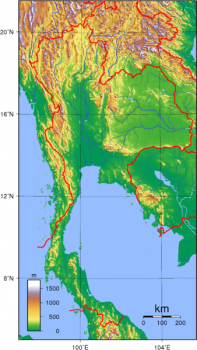Archive for 'Beginner'
Thai Geography Word Match Posted by palmisano on May 28, 2013
In an earlier blog post I talked about Thai geography vocabulary and how to use these words in sentences. This post will help give you practice with those words, as well as reading and spelling them.
Thai Geography Terms Posted by palmisano on May 27, 2013
Today’s post will be on Thai geography related terms. Maybe you’re trying to figure out a map, or asking for directions in Thai while lost on your trip. Or you’d just like to describe how much you like nature, the beach you’re tanning at…
To Think is to Know Posted by palmisano on May 22, 2013
Like in English, the Thai language differentiates between ‘to think’ and ‘to know’. However, Thai is a bit more complicated in that both words can be omitted from a context-obvious sentence, and ‘to know’ is divided up into three different words.
The Dreaded Thai Kows Posted by palmisano on May 20, 2013
When I teach a new set of beginning learners in my class, the very first lesson I give is on Thai tones. To scare them a bit I present various words that sound the same, but change meaning depending on the tone. While most teachers prefer to give the famous ‘mai’ example, I prefer the…
The Hand Posted by palmisano on May 13, 2013
In the last post we learned the basic body parts. Now that you’ve learned a general list of body parts, let’s go to the intermediate level and get more specific with one of them: the hand (meuu1 มือ).
Thai Body Parts Posted by palmisano on May 9, 2013
In Thai culture, different body parts are worthy of different levels of respect. This respect is determined by the height from the ground. For example, the head is the highest and should be revered, while the feet are the lowest and are therefore used to show disrespect. As such, touching a Thai on the head…
Gaw, and more Gaw Posted by palmisano on Apr 30, 2013
The word gaw3 ก็ has another case which I didn’t mention before. In this case, it’s as if you are determining the answer to a question half-way through your answer. By saying it this way, you are implying you hadn’t thought about the answer before being asked about it.



